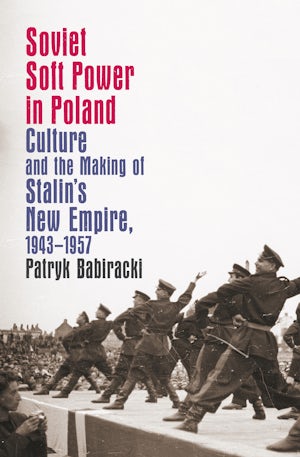Soviet Soft Power in Poland
Culture and the Making of Stalin's New Empire, 1943-1957
By Patryk Babiracki
368 pp., 6.125 x 9.125, 19 halftones, 9 graphs, 3 tables, appends., notes, bibl., index
-
Paperback ISBN: 978-1-4696-5478-2
Published: August 2019 -
Hardcover ISBN: 978-1-4696-2089-3
Published: June 2015 -
E-book EPUB ISBN: 978-1-4696-2090-9
Published: May 2015 -
E-book PDF ISBN: 979-8-8908-4339-5
Published: May 2015
New Cold War History
Buy this Book
- Paperback $39.95
- Hardcover $45.00
- E-Book $19.99
For Professors:
Free E-Exam Copies
Awards & distinctions
Special Mention, Best Foreign Language Publication, Polish Minister of Foreign Affairs' Historical Competition
About the Author
Patryk Babiracki is associate professor in Russian and East European history at the University of Texas-Arlington.
For more information about Patryk Babiracki, visit
the
Author
Page.
Reviews
"Offers interesting observations that can be applied to ancient empires and modern ones. . . . Recommended."--CHOICE
“Soviet Soft Power, by drawing on material from Polish and Russian archives, adds to our understanding of Soviet-Polish cultural interactions and Polish and Soviet propaganda policy during the first decade of the Cold War. It also offers a very useful point of departure for further research. This impressive book will be of interest to a wide range of scholars.”--European History Quarterly
“Provides deepened exploration of fascinating primary materials from Polish and Russian archives combined with published sources into a revealing narrative. . . . An original contribution to our understating of postwar Europe and Soviet cultural outreach which fills in an important gap in knowledge.”--European Review of History
“[A] rich, well-researched, and at times poetically written cultural history of Polish-Soviet relationships in the first years after the war.”--The Russian Review
“A very welcome addition to the growing field of the transnational history of Stalinism and the cultural Cold War. . . . Will be a stimulating read for anyone who wants to look inside the socialist ‘propaganda kitchen’ and reflect on why the Soviet empire lost the Cold War.”--American Historical Review
“Babiracki’s brilliant, big-hearted book burrows inside the aspirations and failures of the Soviet imperial project in eastern Europe. . . . Meticuously researched, thickly layered vignettes describing encounters between Soviets and Poles of various stripes.”--Slavic Review



